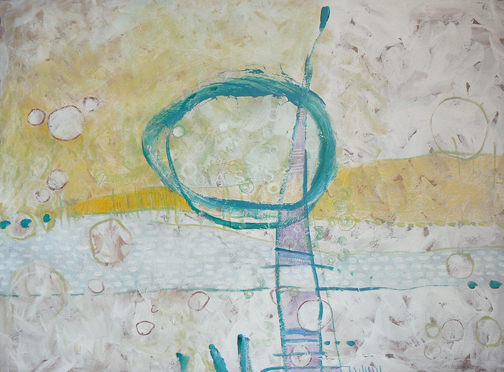Elisha and I have been married for two years now and I learn something new about her every day. Yesterday, for instance, I overheard her say to her daughter Alexandra, who is fourteen, and her son Conor, who is seventeen, “When my mother was a girl in Barcelona, she and her mother would make bouquets from flowers they stole from other people’s gardens. And the one time I went to Spain with my mother, when I was twelve, she took me to the street corner where she used to stand with her basket of bouquets and call to the men and women going home from work, “Flowers for your wife. Flowers for your husband. Flowers for your sweetheart.”
Today in Mona’s, the one and only bakery/café in Carmeline Creek, our small town on the far north coast of California, I learned… well, first I’ll set the scene.
Elisha, who is forty-eight, works at Mona’s from six-thirty in the morning until two in the afternoon. She walks to work from our house a few blocks to the west of Mona’s, arriving in time to help Mona and Jose finish emptying the ovens of the first round of baked goods. Then she fills the display-case trays with muffins and pastries and cookies, brews the coffee, opens the front door promptly at seven, and greets the early birds with her cheerful Good Morning.
Elisha was born and raised in Ireland, her father Irish, her mother Spanish, her accent revealing both lineages. Easy in her body, with long reddish brown hair, her work attire consists of a white dress shirt, the sleeves rolled up to her elbows, a long skirt, tights, colorful socks, and comfortable walking shoes. She is the morning and early afternoon counterperson at Mona’s and would win in a landslide if she ran for mayor, no matter who she ran against.
I am Paul, fifty-seven, a fifth-generation Californian, my father descended from English Irish Scots, my mother from Ashkenazi Jews. I arrive at Mona’s every morning circa ten and spend a few hours at a window table writing letters and poems and short stories, sipping tea and nibbling muffins, and occasionally engaging in conversations with friends.
∆
I sit as far from the counter as one can without going outside, but even so, if I choose to, I can hear Elisha’s exchanges with her customers, though most of the time her conversations with people ordering bread and coffee and pastries blend with other conversations and the clattering of cups and the clinking of silverware and cars driving by and piano jazz playing on the café stereo—a pleasant ambient soundscape to accompany my scribbling.
But this morning I am riveted by the exchanges Elisha has with her customers; and from these exchanges I learn something new and wonderful about my wife.
∆
Allison Hardy, twenty-eight, formidably strong, works at Carmeline Creek Nursery, steps to the counter.
Elisha: Good morning Allison. You look marvelous. Sleeping better?
Allison: (exuberant) I am. I’ve been following your advice and it really works.
Elisha: Oh I’m so happy to hear that. What can I get for you?
Allison: Well, per your suggestion, I’ll have a small decaf and two bran muffins. To go.
Elisha hands Allison a white paper cup for the self-serve coffee, a white bag containing two muffins, rings up the sale, and as Allison moves away, Thomas Enders, fifty-seven, owner of Enders Hardware, burly, avuncular, steps to the counter.
Elisha: Morning Thomas. The usual?
Thomas: Well I was going to say the usual, but I couldn’t help overhearing Allison say you helped her sleep better. I’ve been having a terrible time getting to sleep and staying asleep for the last… I don’t know… years and years, and I wonder if what you told her might help me, too.
Elisha: It might, but I have the feeling your sleep issues are not quite the same as Allison’s. May I ask you a question or two?
Thomas: (reddens) Sure.
Elisha: Do you stay up late? Past ten?
Thomas: Yes. We watch television every night until eleven and then I let the dog out for a few minutes, and when the dog comes back in, we go to bed.
Elisha: What do you watch on television after supper?
Thomas: Oh we usually watch a murder mystery and then the news.
Elisha: Does your wife have difficulty sleeping?
Thomas: She falls right asleep, but then she wakes up. Bad dreams. And if I’ve managed to fall asleep, I wake up when she wakes up, and then I have a terrible time getting back to sleep and we’re both wrecks in the morning, though she’s usually less wrecked than I am.
Elisha: (after musing or a moment) Well I would suggest that instead of watching the news after your murder mystery, you take a walk in the night air, have a cup of chamomile tea, and listen to some music before you go to bed.
Thomas: Oh but we’re addicted to the news. It’s the grand finale of our day.
As Thomas and Elisha converse, Margaret Johannsen, sixty-three, graphic artist, deep-voiced, gets in line and listens avidly to Elisha and Thomas’s conversation.
Elisha: But Thomas, that’s the pattern you need to break. The murder mystery and the news engage your intellect and ignite a subtle fear response, so when you go to bed you’re in a state of mental agitation.
Thomas: Hmm. So do you think I should switch to decaf?
Elisha: (laughs) I don’t think caffeine is your problem. I think it is your inquiring mind being too excited to sleep. Our left brain, the analytical brain, is meant to run the show during our waking hours, but the right brain is what we want overseeing our sleep.
Thomas: Well, I’ll give it a try. Sure would love to have a good night’s sleep. So… no news, walk outside, chamomile tea, music. What kind of music?
Elisha: Piano.
Thomas: Piano. Okay. And… yes, I’ll have the usual.
Margaret Johannsen: Forgive me for barging in, Thomas, but I urge you to do whatever she tells you. I hadn’t had a good night’s sleep in a decade, and three nights after I started following her prescription, I slept for nine hours and felt reborn, and now I sleep like a baby every night.
Thomas: What did she tell you to do?
Margaret: Before bed, I do twenty minutes of gentle yoga, then I take a warm bath, and while I’m in the bath, I sing. Then I eat a banana, brush my teeth, get in bed, and envision in real time preparing the ground for planting carrot seeds, planting the seeds, watering the bed, and… I rarely get past planting the seeds before I’m asleep.
Thomas: Were you watching the news, too?
Margaret: No, I was surfing the internet and dreading another night without good sleep.
Thomas: A banana? (turns to Elisha) Should I try eating a banana?
Elisha: If you’re hungry. Most people don’t realize it takes energy, calories, to sleep. So if you wake in the middle of the night and can’t get back to sleep, try eating a banana or a piece of bread with almond butter on it, and when you get back in bed, imagine your body being ready now to do the slow and gentle and steady work of sleep.
∆
When Elisha gets home from work mid-afternoon, we take our four dogs for a walk to the beach, and while I’m flinging tennis balls for the dogs, I say to Elisha, “I had no idea you knew so much about sleep.”
She smiles and says, “I wouldn’t say I know much about sleep. But for some reason when I look at a person who is not sleeping well, a solution occurs to me, and sometimes that solution works. But I think the most important thing, no matter what I suggest, is that the person breaks the old pattern with an intention to sleep better, and this intention combined with the new way of getting ready for bed is what does the trick.”
fin


